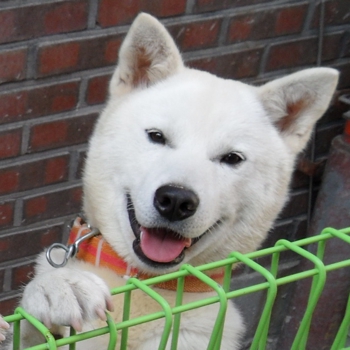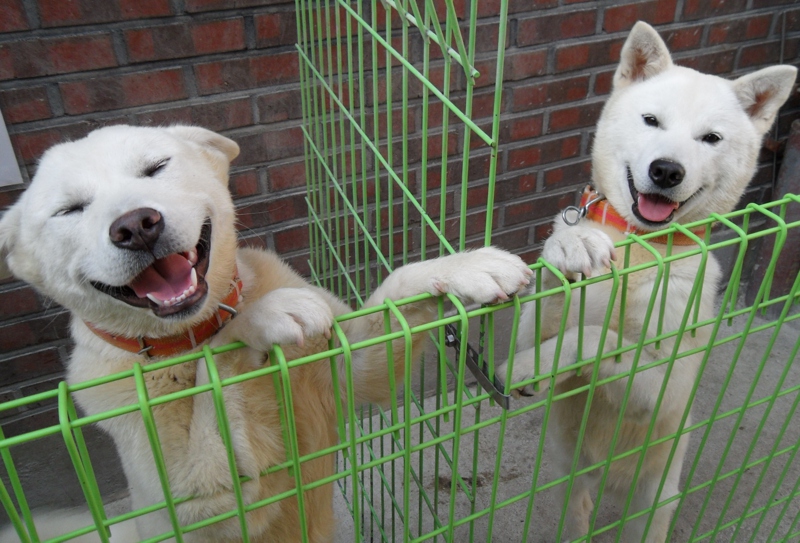Pungsan Dog

A Spitz-type dog, the Pungsan dog is a medium to large-sized, muscular and athletic breed that is best identified by its thick, white fur coat. While similar in appearance to their neighbour, the South Korean Jindo dog, they are larger and taller.
Historically used to hunt ferocious predators in the mountains of North Korea, this breed is prized for its strength of character and spirited nature. A hardy dog, they can easily spend hours outside in freezing temperatures patrolling their territory and relishing the opportunity to be free in the great outdoors.
About & History
The Pungsan dog is also known as the ‘Poongsan dog’ and is one of only three dog breeds native to Korea (the others breeds are the Sapsali and the Korean Jindo). In fact, the Pungsan is the rarest of the three and is practically unheard of internationally.
Sometime around the 16th century, the Pungsan dog was developed in the mountains of North Korea. Records are absent and their heritage is open to speculation, with some experts claiming the breed descends from Siberian Laika dogs and others maintaining they are ancestors of a mix of Mastiff and Herding breeds. Some breed enthusiasts even argue there may be wolf in the line, though this has not been genetically proven. What is known, is that this courageous dog would have been largely used for hunting large predators, including boar and tigers. As well as this role, they would have also been kept for companionship and as guard dogs.
During the Japanese occupation of North Korea, the breed was declared a national treasure; an event which protected it during the World War, when many other dogs were not so lucky. In later years, North Korea aimed to protect the purity of the breed by forbidding it from being exported across its border; a rule which was not always followed, with breed members often showing up in South Korea and even China.
In a significant event, in the year 2000, the Pungsan breed was etched forever into history when two Pungsan dogs were gifted from the president of North Korea to the president of South Korea. At the same time, the North Korean president was gifted two Jindo pups. The Pungsan dogs were a male and female, and while they initially lived in the ‘Blue House’ in Seoul, they were later moved to the zoo. They have been bred from and the lines produced are highly valued today.
The Pungsan dog is not currently recognised by any major kennel clubs.
Appearance

The Pungsan features all of the characteristics typical of a Spitz breed; a plush coat, wedge-shaped face, prick ears and a tail that curls over their back. They should also have dark almond-shaped eyes that are alert. Their robust and balanced bodies are strong and well-muscled, allowing for agile movement and good stamina. Their limbs are straight while their paws are well-rounded.
This breed is prized for its luxurious double coat. Their outercoat is harsh, while their undercoat is soft and fine. Their fur is an off-white colour. Their coat is so effective that they can comfortably sleep in the snow for hours on end without getting cold.
Breed members measure from 55cm to 60cm and typically weigh between 20kg and 30kg.
Character & Temperament
The Pungsan dog is probably best known for the loyalty it shows its master and its bravery when hunting or defending its territory. It is a noble breed that will not back down from challenges and remains devoted to its master for life. Not surprisingly, the high prey drive of the Pungsan dog makes it a poor fit for multi-animal households, as they do not tolerate the company of small pets, such as cats or rabbits. This breed can be housed alongside other dogs, though they must be introduced to them from a young age.
Despite their independent nature, this is a dog that thrives on human company and should be homed with a family that have time to spend with it and to dedicate to its training. The Pungsan dog is affectionate with those family members it is closest to, though will act aloof with new people.
One of the best guard dogs, the Pungsan dog is highly territorial and not afraid to fight off a potential threat. While they will initially attempt to warn intruders away with a bark, they have the potential to be aggressive if pressed. Similarly, their keen senses make for a superb watch dog that won’t let anything occur without its permission.
Trainability
Training is critical if the Pungsan dog is to mature in to a sensible and well-rounded adult. Failure to adequately train this breed will potentially result in a hostile dog that makes its own rules and can be unpredictable. A trainer should not allow the Pungsan dog to take the dominant role in the relationship and must lay down consistent rules from the get-go. The training methods should be firm and fair and the Pungsan dog must understand who is in charge.
This breed benefits from an experienced trainer; ideally, one who has worked with Pungsan dogs before. They can test boundaries and can be wilful and strongminded. While their intelligence means that they have the potential to obey complex commands and perform a variety of roles, it can often be a real challenge to get them on side and convince them to listen for long periods of time.
Health
Often living to the age of 13 or 14, the Pungsan dog is a long-lived breed that tends to enjoy quite good health and is not prone to many health issues. The following is a list of conditions that they may be slightly more prone to than the general canine population:
Hip and Elbow Dysplasia
Poor hip and elbow health can mean the end of a line of breeding dogs as these conditions are known to be hereditary and can hugely impact on the quality of life of a litter. With screening programs widely available, it would be irresponsible for a breeder to not check the joint health of their breeding dogs and bitches before mating them.
Entropion
Eyelids that roll too far inwards can scrape on the surface of the eye and, over time, can lead to corneal scarring and painful eye infections. Surgeries to repair the eyelid defect are commonly performed and tend to have high success rates.
Bloat
A condition whereby the stomach bloats up with gas and fluid before rotating and blocking itself off, bloat can be fatal without intervention. An animal suffering from bloat will act distressed; panting, retching and pacing up and down, unable to settle. No time should be wasted and these dogs need to be brought to the veterinary clinic immediately to give them the best chance of surviving.
Exercise and Activity Levels
A large and powerful dog, the Pungsan dog needs plenty of exercise to keep it in good shape. A breed that can get bored quickly, they benefit from being provided with a variety of activities, including hikes, agility courses and hunting. They enjoy having the freedom to roam off lead though care must be taken when in public areas as their hunting instincts may kick in. Ideally, they would have a safe, fenced-in back garden to run about in.
While their plush coat makes them well-suited to the outdoor environment, they should not be kept outside all of the time, as they are domesticated dogs that enjoy spending time indoors with the family. Their thick coat can make them prone to overheating during exercise, so caution is advised in warmer months, when the Pungsan dog should not be pushed too hard.
An under-stimulated Pungsan dog is likely to develop nuisance behaviours, such as excessive chewing or digging. Avoid this by filling their day full of fun workouts and training exercises.
Grooming
With so much fur to keep them warm and protected, these dogs can shed quite a lot, particularly during their bi-annual moulting season. As long as they are brushed regularly, they tend to be a clean breed and rarely need baths. Anecdotally, they do not give off the classic ‘dog smell’.
Famous Pungsan Dogs
Dangyol and Jaju, the two dogs that were given as gifts to the former President of South Korea from the former President of North Korea in 2000, are likely the two most well-known Pungsan dogs.
Cross-Breeds
The Pungsan and the Jindo have been bred together on many occasions in breeding programs in Korea.

